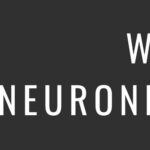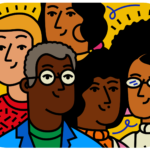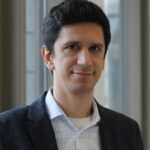Although physical distancing does not necessarily mean social distancing, as it was first referenced in the start of the COVID-19 pandemic, they are often one and the same. Being social usually means spending time with others in a shared physical space, which is undeniably different than the virtual interactions that have become the accepted norm. Seeing our friends and family from behind a monitor is especially dissatisfying when we are only kilometers apart, and while having hundreds of social media “friends” means that we are in many ways more connected than ever, greater use of social media has actually been linked to increased loneliness (1,2).
Physical distancing and working from home also mean that we have lost our so-called weak-ties, our daily interactions with colleagues, neighbours, and acquaintances who we don’t know well enough to pick up the phone and call, but who nevertheless play an important role in our social lives. Through all of our social interactions, whether with close family or casual acquaintances, we share stories and exchange experiences, providing the backbone for meaningful friendships and social ties. In sharing our stories, we not only weave our own personal values, but we communicate the lessons that we learn through our lived experiences that could benefit those listening. The pandemic has made this level of connection difficult for many, and brings with it an inevitable epidemic of loneliness in our communities, affecting both young and old.
Of the Canadian provinces, Quebec and Ontario have been hit the hardest by COVID-19. These provinces also have the largest populations of older adults, with the highest median ages after the Atlantic provinces. In part because they are most vulnerable to severe symptoms from the virus itself, older adults are particularly at risk of suffering negative consequences from prolonged social isolation and loneliness. Social contact may be extremely limited among older adults who may not have access or interest in multiple forms of social media and technology and usually rely on in-person social events to stay connected.
There is also growing concern for younger adults who may be suffering increased social isolation as a result of the pandemic. University students rely heavily on their social institutional infrastructure to form friendships and provide a support system throughout their programs, and with remote learning, much of that is lost. With the cancellation of Frosh week and in-person orientation events, new students will miss out on valuable opportunities to meet friends and form connections. Mental health among graduate students is of particular concern, with most reporting feelings of social isolation and loneliness even before the pandemic (4). For many graduate students, COVID-19 has halted their research entirely, and for others, working from home has impacted their productivity in ways that are detrimental to mental health.
Social isolation at all ages is a public health concern, exacerbated in this time of the pandemic (5). Recently, researchers at McGill university won a multi-million-dollar grant to learn more about loneliness and brain structure/function, highlighting the importance of understanding social interactions on brain health.
So far, research demonstrates considerable negative consequences to mental and physical health outcomes, increasing the risk for both heart disease and dementia (6,7). A recent study reported that lack of social contact is among the 12 modifiable risk factors* (i.e., that could be prevented or delayed) that contributes to about 40% of dementia diagnoses worldwide (8).
Perhaps even more concerning is that research has found that higher loneliness is associated with structural changes to the brain’s gray and white matter. While gray matter contains most of the neuronal cell bodies, white matter contains their axons, which are the pathways for communication between different parts of the brain. Research shows that higher levels of loneliness are linked to reductions in both gray and white matter structures in brain areas associated with social cognition (9,10).
The good news is that increased social contact has been shown to improve cognitive processing (11) and may even protect the brain from adversity (12). So can social connection build resilience? Increasing evidence seems to suggest that this is the case, but one thing’s certain – it won’t do any harm. So what can we do right here and now to help fill the social void?
In our fast-paced society, authentic intergenerational friendships are rare, made even more so in this time of physical distancing and virtual socializing. But perhaps one silver lining of the pandemic is that it can bring people of all ages and backgrounds together through shared experiences. While we may not all be in the same boat, we are all weathering the same storm, and now is the time to leverage members of the community to support and reconnect with each other to build lasting relationships. Having meaningful intergenerational conversations can result in an exchange of experiences that is truly unique.
The Wisdom Exchange Project is a social connection program that connects graduate students with older adults in Ontario and Quebec. Recognizing that intergenerational friendships can be an extremely rewarding source of meaning and a fertilizer for growth, but that it is often difficult to forge such relationships beyond one’s immediate family, the program aims to facilitate the initial connections and then let the magic happen. Once enrolled in the program, students and older adults will be paired based on their preferences, whether it be a common language or a hobby, to ensure that they start off well. The pairs will then determine their own pace and means of communication. We will also invite interested participants to attend information sessions to learn more about the research conducted by graduate students and faculty on fascinating research topics, such as the factors that promote healthy aging, and much more!
To learn more about how you can get involved with the Wisdom Exchange Project, please email us at wisdom.exchange.project@gmail.com. If you are a trainee interested in participating in the program, please complete our volunteer questionnaire at https://www.surveymonkey.com/r/MSVV639. If you are an older adult, please complete our questionnaire at https://www.surveymonkey.com/r/WKRZGG7. We will contact you to get the social connection process rolling!
*The other 11 risk factors listed in this study are less education, hypertension, hearing impairment, smoking, obesity, depression, physical inactivity, diabetes, excessive alcohol consumption, traumatic brain injury, and air pollution.
Sivaniya Subramaniapillai completed her PhD in Experimental Psychology at McGill University in 2021. Her research aims to characterize brain-aging trajectories of women and men and understanding the lifestyle factors that contribute to healthy aging. Sivaniya is excited about fostering scientific dialogue between the research community and the public in a way that promotes greater inclusivity and public engagement. To sign up to her personal newsletter, please visit http://sivaniya.beehiiv.com/.







Ping : Psychology grad student helps older adults cope with social isolation, loneliness - McGill Reporter
The Québec seniors network FADOQ might be useful.
Your text above needs to be shortened or formatted with cutlines – too dense otherwise. Especially if you want to reach out.
Good luck with your project.
(I am a senior, but happily not lonely. )
Thank you for your feedback! We’ll reach out to FADOQ. I will definitely take note of the writing for next time 🙂
There are many organizations in Montreal that offer similar services, sometimes I wonder why they do not research what is out there and offer their resources to programs that are running long term and for years. Duplication of initiatives can negatively impact local organizations which may see their funding dwindle and be a competition causing some of them to close down.
Very interesting, nice work. The survey included looks like for graduate students only. How are the seniors recruited? Would be great to include something similar for seniors to get easily involved.
Hi Brandon,
Thank you for your interest! We’re finalizing our questionnaire for seniors, which will be released next week. You can email us at wisdom.exchange.project@gmail.com and we’ll reach out to you with the link to the questionnaire once it’s ready.
Ping : This is your brain on COVID: Is the pandemic changing human nature? – Blogue du RBIQ | QBIN blog